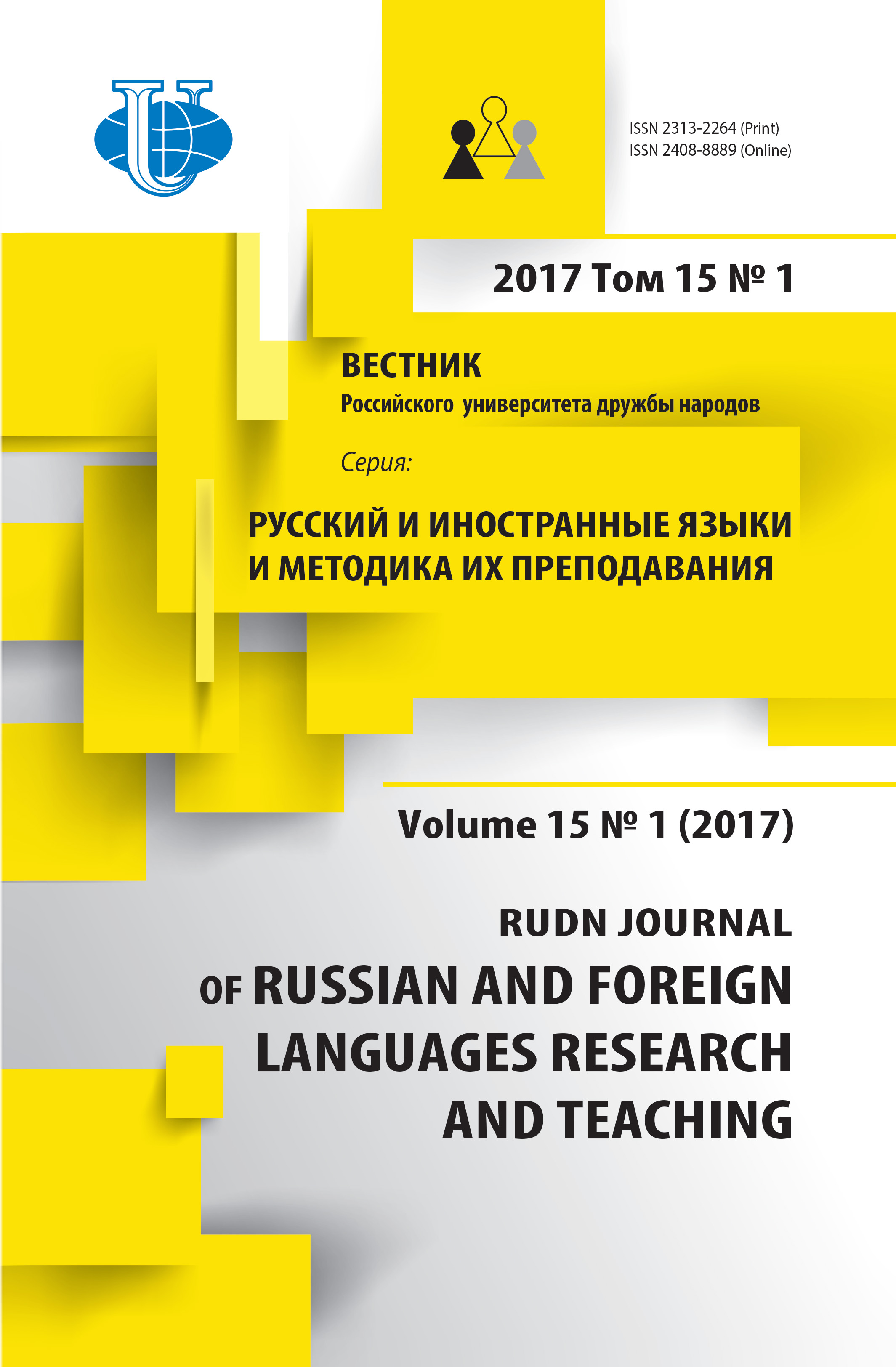TECHNOLOGY OF FORMING THE ABILITY FOR AUTONOMOUS LISTENING OF LANGUAGE UNIVERSITY STUDENTS OF 1-2 YEAR
- Authors: Dudushkina S.V.1
-
Affiliations:
- Institute of Forein Languages, Moscow State Pedagogical University
- Issue: Vol 15, No 1 (2017)
- Pages: 66-76
- Section: Articles
- URL: https://journals.rudn.ru/russian-language-studies/article/view/16030
- DOI: https://doi.org/10.22363/2313-2264-2017-15-1-66-76
- ID: 16030
Cite item
Full Text
Abstract
In the present article the high degree of self-dependence and capability for self-knowledge and self-improvement of the students is considered as a differential characteristic of the present step of higher education development. During the analysis of scientific researches the necessity of students autonomy during language courses was found out. For the first time the author defines the principle of students autonomy as basis of autonomous listening in educational process. The author proves the necessity of autonomy principle actualization in forming capability for listening by widening international cooperation, requirements of program documents and information technology. On the basis of the conducted research the author provided the technology of forming the capability for autonomous listening of students during basic language course. The principles, the methods, the strategies and the means of forming the capability for autonomous listening are presented in this article. The author distinguishes successive steps of cooperation between teacher and student defining common strategies of teacher which stimulate students for autonomous listening of audio materials for the purpose of self-consistent comprehension and information processing, and also for potential forms of self- and inter-control in order to establish a high level of using the skills of autonomous listening in educational process.
About the authors
Svetlana Viktorovna Dudushkina
Institute of Forein Languages, Moscow State Pedagogical University
Author for correspondence.
Email: Sepia3@yandex.ru
PhD (Pedagogy), senior assistant professor of the French Language and Linguodidactics department, Institute of Foreign Languages
2-оj Sel`skokhozajstvennyj projezd, d. 4, k. 1, Мoscow, Russia, 129225References
- Trofimova I.D. Metodika formirovaniya strategiy avtonomnogo chteniya studentov yazikovogo vuza (nemesckiy yazik, I kurs) [Methods of forming the strategies of autonomous reading of students of language universities]: diss. … kand. ped. nauk [Thesis for a Master’s Degree in Pedagogy]. UlanUde, 2003. 222 p. (in Russ)
- Apanovich Е.V. Metodika formirovania uchebnogo umeniya samostoyatel`no aktivizirovat` yazikovoy material: nachal`niy etap, yazikovoy vuz [Methods of forming the educational ability for autonomous activization of language material]: diss. … kand. ped. nauk [Thesis for a Master’s Degree in Pedagogy]. Irkutsk, 2003. 189 p. (in Russ)
- Bikkulova G.R. Metodika distanscionnogo formirovania kommunikativnoy kompetenscii studentov yestestvennix fakul`tetov universiteta (na material`e angliyskogo yazika) [Methods of distant forming the communicative competence of students of science faculty (on basic of English language)]: avtoref. diss. … kand. ped. nauk [Synopsis of Thesis for a Master’s Degree in Pedagogy]. SaintPetersburg, 2008. 21 p. (in Russ)
- Tareva E.G. Konscepsciya razvitiya uchebnopoznavatel`noj samostoyatel`nostu studentov [The conception of educational autonomy development of students]. Irkutsk, 2003. 24 p. (in Russ)
- Gavriluk O.V. Pedagogicheskiye usloviya formirovania gotovnosti buduchhego prepodavatel`a k professional`noj avtonomii [Pedagogic conditions of forming the readiness of future teacher for professional autonomy]: diss. … kand. ped. nauk [Thesis for a Master’s Degree in Pedagogy]. Irkutsk, 2005. 133 p. (in Russ)
- Tunina O.V. Metodicheskaya organizasciya obucheniya audirovaniyu v usloviyax individualizascii (nachal`nij uroven` kratkosrochnogo obucheniya anglijskomu yaziku po metodu aktivizascii vozmojnostej lichnosti i kollektiva) [Methodic organization of comprehension education in the conditions of individualization]: diss. … kand. ped. nauk [Thesis for a Master’s Degree in Pedagogy]. М., 2004. 228 p. (in Russ)
- Brjozovskaya K.M. Metodika obucheniya audirovaniyu pol`emicheskix tekstov studentov starshix rursov yazikovogo vuza [Methods of comprehension education of polemic texts of students of advanced level in language pedagogic universities]: diss. kand. ped. nauk [Thesis for a Master’s Degree in Pedagogy]. М., 2003. 133 p. (in Russ)
- Kironova M.S. Rechevedcheskiye osnovi audirovaniya uchebnix lekscij yazikovogo profil’a [Speech studies basis of comprehension of educational language lectures]: diss. … kand. ped. nauk [Thesis for a Master’s Degree in Pedagogy]. Samara, 2002. 233 p. (in Russ)
- Abramovskaya N.Yu. Viyavleniye trudnostej pri obuchenii audirovaniyu, obuslovlennix stilevoj prinadlejonost’yu zvuchachhix tekstov: na material`e angliyskogo yazika dl`a mladshix kursov yazikovogo vuza [The detecting of difficulties during the comprehension education based on stylistic tenancy of the texts: based on the English language material for junior language university students]: diss. … kand. ped. nauk [Thesis for a Master’s Degree in Pedagogy]. М., 2000. 166 p. (in Russ)
- Kolesnikova E.A. Obucheniye audirovaniyu s pis`mennoj fiksasciyej suchhestvennoj informascii studentov pervogo kursa yazikovogo pedagogicheskogo vuza (angliyskij yazik) vuza [The comprehension education with written fixation of essential information of junior pedagogic language university students]: diss. … kand. ped. nauk [Thesis for a Master’s Degree in Pedagogy]. М., 2009. 240 p. (in Russ)
- Xutorskoj A.V. Sovremennaja didaktika [Contemporary didactics]. М.: Vyschaja chkola, 2007. 639 p. (in Russ)
- Chhukin A.N. Lingvodidakticheskij enciklopedicheskij slovar` [Linguvodidactics encyclopaedic dictionary]. M.: Astrel: AST: Chranitel, 2008. 746 p. (in Russ)
- Lerner I.Ya. Didakticheskiye osnovy formirovanija poznavatel`noj samostoyatel`nostu uchachhixsa pri izuchenii gumanitarnyx discipline [Didactcics`main forms of forming the independent work of students while studying humanitarian disciplines]: avtoref. diss. … dra ped. nauk [Synopsis of Thesis for a Doctor’s Degree in Pedagogy]. М., 1971. 38 p. (in Russ)
- Skatkin M.N. Rukovodstvo samoobrazovaniem chkol`nikov: iz opyta raboty [The direction for schoolboy’s autoeducation]. M.: Prosvechhtnije, 1983. 143 p. (in Russ)
- Dudushkina S.V. Integral`nyje sostavlajushhije sposobnosti к avtonomnomu audirovaniu studentov, izutchajuchhyx inostrannyj yazyk [The integral components of ability for autonomous listening of students studying a foreign language]. Vestnik Cherepovetskogo gosudarstvennogo universiteta [Vestnik of Cherepovets state university]. Cherepovets, 2014. No. 8. Pp. 112—115. (in Russ)
Supplementary files














